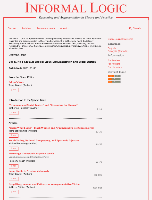
Informal Logic
Scope & Guideline
Unlocking Insights in Reasoning and Communication
Introduction
Aims and Scopes
- Argument Evaluation:
A significant focus is placed on the evaluation of arguments, encompassing various methodologies to assess argument quality, strength, and the criteria that make an argument persuasive or valid. - Interdisciplinary Approaches:
The journal promotes interdisciplinary research that integrates insights from philosophy, linguistics, psychology, and rhetoric to enhance the understanding of argumentation. - Contextual and Emotional Factors:
Research addressing the role of context and emotional aspects in argumentation is a core area, exploring how these factors influence reasoning and persuasion. - Fallacies and Misunderstandings:
The journal examines common fallacies and misconceptions in argumentation, contributing to critical thinking by identifying and analyzing flawed reasoning. - Educational Implications:
There is a consistent emphasis on the implications of argumentation theory for education, particularly in fostering critical thinking skills and intellectual virtues among learners.
Trending and Emerging
- Impact of Technology on Argumentation:
The integration of technology, particularly generative AI and its influence on argument creativity, has become a prominent theme, reflecting the changing nature of discourse in the digital age. - Emotional and Persuasive Strategies:
There is an increasing focus on understanding how emotional appeals and persuasive strategies function within arguments, emphasizing the interplay between emotion and rationality. - Contextual and Situational Factors:
Research exploring the significance of context and situational factors in argumentation is gaining traction, highlighting how these elements shape the effectiveness and reception of arguments. - Ethical Considerations in Argumentation:
Emerging discussions around ethical argumentation practices indicate a growing concern for responsible arguing and the role of argumentation in social justice and public discourse. - Educational Frameworks for Argumentation:
There is a rising trend in developing educational frameworks aimed at teaching argumentation and critical thinking skills, reflecting an increased awareness of the importance of these skills in academic and everyday contexts.
Declining or Waning
- Formal Logic Applications:
Research focused on the formalization of arguments and strict logical structures appears to be decreasing, as the field shifts towards more contextually grounded approaches to argumentation. - Historical Argumentation Studies:
There seems to be a waning interest in purely historical analyses of argumentation, as contemporary discussions increasingly prioritize current applications and relevance in modern discourse. - Overly Technical Analyses:
Papers that delve deeply into technical aspects of argumentation theory without practical implications are becoming less common, suggesting a trend towards more accessible and applicable research. - Philosophical Justifications of Argumentation:
While philosophical discussions remain important, there is a noticeable decline in papers solely dedicated to justifying argumentation theories, with a preference for empirical studies and practical applications.
Similar Journals
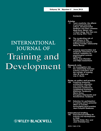
International Journal of Training and Development
Advancing Human Potential in Training and DevelopmentThe International Journal of Training and Development, published by WILEY, is a premier academic journal dedicated to the dynamic fields of education and human resource development. With an ISSN of 1360-3736 and an E-ISSN of 1468-2419, this journal has established itself as a critical resource for researchers and practitioners alike, boasting a Q2 ranking in both Education and Organizational Behavior and Human Resource Management categories as of 2023. The journal, with a significant impact factor, is committed to advancing knowledge through empirical research, theoretical analysis, and integrative reviews that explore the latest trends, practices, and theories in training and development. Since its inception in 1997, it has served as a vital platform for scholarly discourse and innovation. Moreover, drawing on its recognized standing within Scopus, where it ranks in the 69th percentile for Education and the 51st percentile for Organizational Behavior, the International Journal of Training and Development fosters an interdisciplinary dialogue aimed at enhancing workforce development and organizational effectiveness. Researchers, educators, and professionals seeking to impact the field will find valuable insights and transformative ideas within its pages.

Argument & Computation
Empowering Research in Argument and Computational ScienceArgument & Computation is an esteemed academic journal dedicated to the interdisciplinary exploration of formal structures of argumentation and their computational applications. Published by IOS PRESS based in the United Kingdom, this Open Access journal, since its inception in 2010 and particularly impactful since 2016, serves as a pivotal platform for researchers and practitioners seeking to advance the fields of Artificial Intelligence, Computational Mathematics, Computer Science Applications, and Linguistics. With its current categorization in Q3 in Artificial Intelligence, Q2 in Computational Mathematics, and Q1 in Linguistics and Language for 2023, the journal maintains a commendable position within the scholarly community, evidenced by its high Scopus rankings, notably in Linguistics and Language where it ranks in the 92nd percentile. By fostering innovative research and discussions, Argument & Computation plays an essential role in bridging theoretical insights with computational practices, making it indispensable for academics, students, and professionals invested in the evolution of argumentation frameworks and their implications in technology and society.

Ensenanza de Las Ciencias
Fostering Global Knowledge Exchange in Science TeachingEnsenanza de Las Ciencias is a leading academic journal dedicated to the field of education, with a particular focus on the methodologies and practices involved in teaching sciences. Published by Universitat Autònoma de Barcelona, this journal is on a mission to disseminate innovative research and pedagogical strategies that enhance scientific education. Since adopting an Open Access model in 2010, Ensenanza de Las Ciencias has become increasingly accessible to a global audience, facilitating the exchange of knowledge among researchers, educators, and students. With its ISSN 0212-4521 and E-ISSN 2174-6486, the journal boasts an impressive impact, ranking in the Q2 category for education as of 2023 and securing a respectable 49th percentile ranking in Scopus among Social Sciences - Education publications. The journal's converged years, spanning from 2009 to 2024, highlight its ongoing commitment to advancing educational practices. In an ever-evolving academic landscape, Ensenanza de Las Ciencias plays a crucial role in shaping future educators and fostering a deeper understanding of science education in Spain and beyond.

JOURNAL OF PHILOSOPHICAL LOGIC
Cultivating Groundbreaking Research in Philosophical LogicThe JOURNAL OF PHILOSOPHICAL LOGIC, published by Springer, is a prestigious scholarly journal specializing in the intricate intersections of logic, philosophy, and their diverse applications. Since its inception in 1972, this eminent journal has become a cornerstone of philosophical discourse, attracting leading researchers and scholars in the field. With an impressive ranking of #77 out of 806 in the Scopus Arts and Humanities - Philosophy category and being positioned in the top 10th percentile, it stands as a Q1 journal, denoting its significant impact and rigorous standards in academic publishing. Although not an Open Access journal, it offers access to a wealth of high-quality articles contributing to the advancement of logical theory and practice until 2024. The journal aims to foster a vibrant platform for the exploration and development of philosophical logic, encouraging groundbreaking research and innovative dialogue among professionals and students alike, and solidifying its role as an essential resource within the philosophical community.

JOURNAL OF LOGIC AND COMPUTATION
Illuminating the Intersections of Logic and Computer ScienceJOURNAL OF LOGIC AND COMPUTATION, published by Oxford University Press, is a leading peer-reviewed journal dedicated to advancing research in the intersections of logic, computation, and theoretical frameworks of computer science. With an ISSN of 0955-792X and an E-ISSN of 1465-363X, the journal has established itself within academic circles, boasting significant impact evidenced by its category quartiles, including a Q1 ranking in Arts and Humanities (miscellaneous) and a Q2 in Logic for 2023. This prestigious journal emphasizes interdisciplinary approaches to understanding computational systems, hence targeting a diverse audience of researchers, professionals, and students keen on exploring provocative questions in logic and computation. Although not open access, the content is highly valuable, reflecting contemporary challenges and advancements in the field. With over three decades of published work, spanning from 1990 to 2024, the journal continues to contribute richly to the discourse surrounding logical methodologies and computational innovations, making it an essential resource for those engaged in these dynamic areas of study.
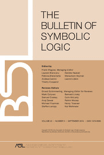
BULLETIN OF SYMBOLIC LOGIC
Illuminating the Pathways of Logical InquiryBULLETIN OF SYMBOLIC LOGIC, published by Cambridge University Press, is a distinguished academic journal that serves as an essential platform for the dissemination of research in the realms of logic and philosophy. Since its inception in 1995, this journal has progressed through its convergence years and remains committed to fostering intellectual discourse among scholars. With a 2023 ranking in the Q1 category of Philosophy and a Q3 classification in Logic, it continues to uphold its reputation as a significant contributor to the field. While operating under a traditional subscription model, the journal dedicates itself to publishing high-quality articles that explore foundational issues, advanced theories, and innovative insights in symbolic logic. Researchers, professionals, and students will find invaluable resources within its pages, particularly as it ranks favorably among peers, with noteworthy standings in Scopus rankings. For those seeking to deepen their understanding of logical frameworks and their philosophical implications, BULLETIN OF SYMBOLIC LOGIC is an indispensable resource.

Science & Education
Advancing educational excellence through rigorous research.Science & Education is a prestigious journal published by Springer, dedicated to advancing the field of education through high-quality research and innovative practices. With its ISSN 0926-7220 and E-ISSN 1573-1901, this journal has established a significant impact in the academic community, evidenced by its Q1 ranking in the Education category and an impressive Scopus ranking of 203 out of 1543, placing it within the 86th percentile of education-related journals. Operating from the Netherlands, this journal provides a platform for rigorous scholarship aimed at enriching educational theory and practice, accommodating diverse educational disciplines. While it offers traditional access, its vast array of research, reviews, and theoretical discussions fosters collaboration among researchers, educators, and policymakers. With years of continuous publication from 1992 to 2024, Science & Education remains at the forefront of educational research, making it an essential resource for anyone invested in the world's educational advancements.
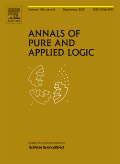
ANNALS OF PURE AND APPLIED LOGIC
Connecting Academics with Cutting-edge Research in LogicANNALS OF PURE AND APPLIED LOGIC is a premier academic journal published by Elsevier, specializing in the foundational aspects of logic since its inception in 1974. With a strong commitment to disseminating original research, the journal focuses on both pure and applied logic, making significant contributions to the fields of mathematics and computer science. The journal is recognized for its rigorous peer-review process and is currently ranked Q1 in Logic, reflecting its status among the top-tier publications in the discipline. Researchers will find valuable insights and advancements in logical theory and practice in its pages, while the journal's Scopus ranking further positions it strategically within the mathematical logic community. Although it is not an open-access publication, it offers convenient access options for institutions and subscribers, ensuring a wide reach for groundbreaking findings. The ANNALS OF PURE AND APPLIED LOGIC continues to be an essential resource for professionals, students, and academics alike, facilitating a deeper understanding of logical frameworks and their applications.

Analisis Filosofico
Cultivating a vibrant community of philosophical inquiry.Analisis Filosofico is a leading open-access journal published by SOC ARGENTINA ANALISIS FILOSOFICO, dedicated to advancing the field of philosophy. Since its inception in 2004, the journal has provided a platform for rigorous philosophical discourse and critical analysis, contributing significantly to the development of contemporary philosophical thought, particularly in the Latin American context. With an ISSN of 0326-1301 and an E-ISSN of 1851-9636, it has consistently maintained a robust presence in academic circles, as evidenced by its rank of #349 out of 806 in the Arts and Humanities Philosophy category on Scopus. The journal currently holds a commendable Q2 status in its category quartiles for 2023 and is positioned in the 56th percentile, reflecting its quality and influence among peers. Situated in Buenos Aires, Argentina, Analisis Filosofico engages with a diverse readership, encouraging scholars, professionals, and students to explore new theoretical perspectives and contribute original research. With ongoing topics converging from 2017 to 2024, this journal not only disseminates philosophical knowledge but also fosters innovative collaborations across the global scholarly community.
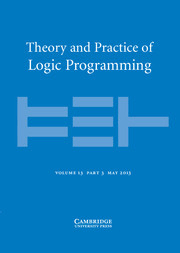
THEORY AND PRACTICE OF LOGIC PROGRAMMING
Elevating Research Standards in Logic Programming.THEORY AND PRACTICE OF LOGIC PROGRAMMING, published by Cambridge University Press, is a premier academic journal that delves into the evolving field of logic programming, offering insights and advancements from 2001 to 2024. With an ISSN of 1471-0684 and an E-ISSN of 1475-3081, this journal serves as a vital resource for researchers, professionals, and students interested in areas such as artificial intelligence, computational theory, and software development. In 2023, the journal was recognized for its excellence, achieving Q1 status in Computational Theory and Mathematics and Q2 in several other categories, underscoring its significant impact within the academic community. Despite not being open access, its robust content, curated by esteemed scholars, guarantees high-quality research and innovative methodologies that are crucial for advancing the field. The journal's rigorous peer-review process and its standings in Scopus rankings further emphasize its relevance and authority, making it a quintessential platform for disseminating key findings and fostering scholarly dialogue.